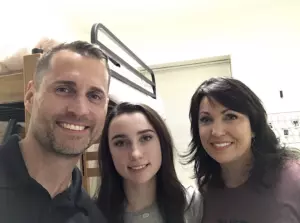
Family photo three months before breast cancer diagnosis.
During my first year of college, my parents visited and insisted I stay with them at their hotel. I found this odd since my dorm was ten minutes away. Why couldn’t I spend the day with them at the hotel and return to the dorm at night? I would get an answer to my question, which would lead to many more that night.
We would spend the day laughing and catching up. All was well, or so I thought, but while I was trying to find ways to get out of staying at the hotel overnight, my mom was trying to figure out how to tell me three big words.
Three Big Words
“I have cancer” were not words I expected to hear on a Saturday in November 2019.
My mom’s voice was shaky, not her familiar strong sound. She was scared. We all were. And as tears met our eyes, I realized how hard that was for her to say aloud. As I complained about staying at the hotel, she was coming to terms with her new reality. It made me consider how I had taken my time with her for granted and how lucky I was her cancer was treatable. She was diagnosed with stage 2, HER2-positive breast cancer, and the following year would involve chemo, radiation, and a lumpectomy.
After my mother told me, she had to tell everyone else. Over and over.
“It became draining, breaking the news. I had to relive the emotions every time I saw someone become upset.” — Amy Morgan
As people became aware of my mom’s breast cancer diagnosis, many women who had similar experiences tried to help. They were trying to schedule phone calls with my mom to give her information and recommendations, and it all became overwhelming. These women were trying to support and help my mom get through this challenging time, but it was still hard for her to process she was sick.
It all happened so fast. I was at home for winter break, and two weeks had passed since my parent’s visit. During this time, my mom went in for her first chemotherapy treatment, and a couple of weeks later, she started to feel and notice visible changes. Sometimes she didn’t have the energy to get up off the couch, and as she began losing her hair, it was hard for her to accept. I remember her saying she thought she had more time before things went downhill, and I remember how she put a smile on her face anyway, day after day.
A New Challenge
Spring 2020 would prove difficult for everyone. Coronavirus was spreading at record rates, resulting in lives lost, businesses shut down, employees laid-off, quarantine, lockdowns, and wearing masks everywhere we went (which wasn’t a lot of places). For my family, cancer and Covid were here in full swing. And while Covid brought worries for everyone, it put those immunocompromised and their family members on extra alert.
“I saw a woman crying because she was scared and had to go through her treatment alone. People would not talk to each other because of masks and sitting far apart. I was already used to the process, but it would have been nice to have someone with me. Volunteers could no longer come by to chat or see if you needed anything. Treatment became very lonely.” — Amy Morgan
During the time of isolation, people began showing their support through social media and instant messenger. I remember my mom sitting on the couch after treatment, reading another “how are you feeling?” text and becoming frustrated. She knew her friends meant well, but it was exhausting having to reply to text messages. She didn’t feel well. Telling people so didn’t make her feel any better.
Despite working periodically throughout her treatment and putting on a brave face, she wanted to be cleaning the house, rearranging the sunroom, and painting the kitchen a new color because she woke up that morning and thought it felt more beige than white. She wasn’t used to sitting down and not being involved in something. It made her feel like she wasn’t contributing when she could no longer do normal tasks at home and it was time for her family to step in.
The Little Things
I went back to school that fall once classes changed from virtual to hybrid. When asking my mom about this time, she said:
“I was very happy you were at college and not having to be home at this time. I hope that you were able to have fun and not be troubled. I feel that the timing was not a coincidence.”
She always pushed me to work hard and do things 100%. I remember the long nights in elementary school when she patiently sat with me doing math homework until I had that “aha” moment, and the solution to the problem didn’t seem so fuzzy anymore. Now, she was encouraging me to continue school, never making me feel guilty about not being with her. She never troubled me during this time, but she motivated me to make being at school worthwhile.
Although I wasn’t living at home during this period, my dad was there to give her the support and help she needed.
“I made sure I was there, and she knew she had a partner who loved her, was praying for her, and would help her fight through it. I wanted her to know I was proud of her and encouraged her daily that she could get through it. I did lots of little things: I made her food, took her to and from treatments, went grocery shopping, made sure she took her meds, and helped her get off the couch when she didn’t feel like it.
I cut her hair, which was pretty emotional for her when it started falling out. Kept everyone updated by creating a CaringBridge account to keep family and friends updated on treatments and test results so she wouldn’t have to tell 50 people or take tons of calls when she felt terrible. Also, to ensure she was aware of what was going on with her treatment plan, I would go to doctor checkups with her (sometimes, she was mentally spent and couldn’t remember it all).” — Clark Morgan
My dad was a big factor in helping my mom get through treatment, and he selflessly went out of his way to make sure she had everything she needed, so she didn’t have to go out in public often since Covid was at its peak. On the rare occasions we went out, I remember him opening the doors and sanitizing his hands immediately after. My mom and I would make jokes about him wearing a mask outside and jumping back if someone came within 10ft of him. But jokes aside, we both were glad he was there to keep our family safe during this time.
The Road to Recovery
In November 2020 (a year after the hotel visit), she was 100% cancer-free. No more chemo, radiation, or surgery lurking in the near future. I asked my mom how she felt during this time, and she said:
“Relieved. Relieved the difficult procedures and worry was over. I don’t think you’re truly ever over it. On a daily basis, I feel back to normal. However, it can be stressful every six months when it’s time to go back to the treatment center for labs and a follow-up. The smell of the infusion clinic triggers difficult times and can cause anxiety for a few days.”
Thankfully, not everything about her treatment was negative. A big positive was the shift in her perspective. Her co-workers often commented how her positive attitude lifted spirits in the office. She was optimistic before treatment, but during and after, it was something she embodied. It made those around her feel at ease.
“I had so many people describe my attitude as positive. It was surprising because I didn’t see myself this way, but during treatment, I learned tough times are just a season. The feelings and struggles were temporary, and it was just something I had to go through. I gave my cares to God and was able to live through this, still having joy in my life. It was amazing to see how many people cared about me and were praying for me all around the world during this time.”
At home, there was also a difference. She was a lot more patient, which could have contributed to this change in her attitude. If things took longer, there wasn’t stress or anxiety surrounding it. She understood these things would get done eventually, and not everything was always perfect. Sometimes there were more important things.
As a cancer survivor, my mother’s perspective on life hasn’t changed a ton, but there are a few things she does differently,
“My outlook on life is still the same, we are not promised tomorrow, and I have always thought that way. Now, I see you need to take care of your health and get regular checkups, which is something I neglected before. I always saw myself as healthy, and that cancer wouldn’t come my way. Cancer does not discriminate.”
Mentally and spiritually, my mother is stronger than ever, but physically she finds she isn’t as strong as she used to be. This experience has taught her the importance of rest. Before, she would try to fit a week’s worth of activities into a day. Now, she listens to what her body needs. Although her mind constantly wants to get things done, she isn’t afraid to take a rest day, and after, she comes back stronger than ever.


